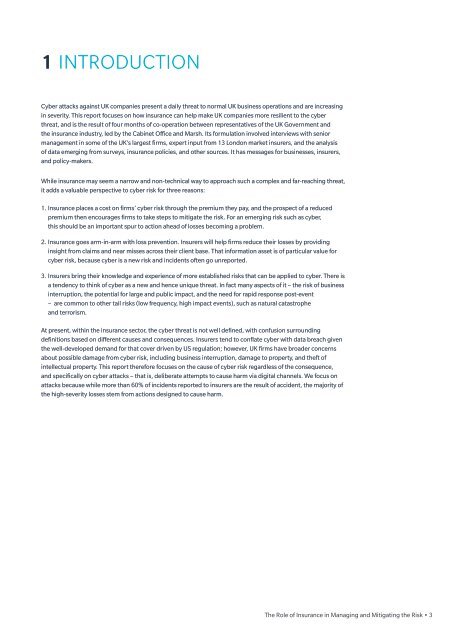k88nFi
k88nFi
k88nFi
Create successful ePaper yourself
Turn your PDF publications into a flip-book with our unique Google optimized e-Paper software.
1 INTRODUCTIONCyber attacks against UK companies present a daily threat to normal UK business operations and are increasingin severity. This report focuses on how insurance can help make UK companies more resilient to the cyberthreat, and is the result of four months of co-operation between representatives of the UK Government andthe insurance industry, led by the Cabinet Office and Marsh. Its formulation involved interviews with seniormanagement in some of the UK’s largest firms, expert input from 13 London market insurers, and the analysisof data emerging from surveys, insurance policies, and other sources. It has messages for businesses, insurers,and policy-makers.While insurance may seem a narrow and non-technical way to approach such a complex and far-reaching threat,it adds a valuable perspective to cyber risk for three reasons:1. Insurance places a cost on firms’ cyber risk through the premium they pay, and the prospect of a reducedpremium then encourages firms to take steps to mitigate the risk. For an emerging risk such as cyber,this should be an important spur to action ahead of losses becoming a problem.2. Insurance goes arm-in-arm with loss prevention. Insurers will help firms reduce their losses by providinginsight from claims and near misses across their client base. That information asset is of particular value forcyber risk, because cyber is a new risk and incidents often go unreported.3. Insurers bring their knowledge and experience of more established risks that can be applied to cyber. There isa tendency to think of cyber as a new and hence unique threat. In fact many aspects of it – the risk of businessinterruption, the potential for large and public impact, and the need for rapid response post-event– are common to other tail risks (low frequency, high impact events), such as natural catastropheand terrorism.At present, within the insurance sector, the cyber threat is not well defined, with confusion surroundingdefinitions based on different causes and consequences. Insurers tend to conflate cyber with data breach giventhe well-developed demand for that cover driven by US regulation; however, UK firms have broader concernsabout possible damage from cyber risk, including business interruption, damage to property, and theft ofintellectual property. This report therefore focuses on the cause of cyber risk regardless of the consequence,and specifically on cyber attacks – that is, deliberate attempts to cause harm via digital channels. We focus onattacks because while more than 60% of incidents reported to insurers are the result of accident, the majority ofthe high-severity losses stem from actions designed to cause harm.The Role of Insurance in Managing and Mitigating the Risk • 3


